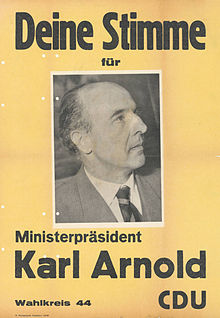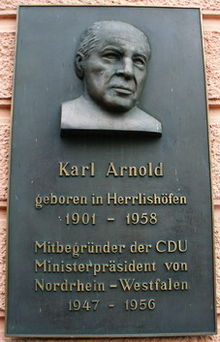Karl Arnold (politician)
Karl Borromäus Arnold (born March 21, 1901 in Herrlishöfen ; † June 29, 1958 in Düsseldorf ) was a German politician ( center , CDU ) and a representative of Christian Socialism . From 1947 to 1956 he was the second Prime Minister of North Rhine-Westphalia . From September 7, 1949 to September 6, 1950 he was the first President of the Federal Council .
Life and work
Karl Arnold completed an apprenticeship as a shoemaker after primary school, which he completed as a journeyman in 1919. In 1920 and 1921 he studied at the Leohaus Social University in Munich ; In autumn 1921 he moved to Düsseldorf to take a position as a functionary at the Christian Leather Workers' Association. He saw himself as a Christian socialist all his life .
In 1920 Arnold joined the German Center Party and the Catholic labor movement . From 1920 he worked full-time as a functionary of the Christian trade unions . In 1924 Arnold became secretary of the Düsseldorf district of the Christian trade union. From 1925 to 1933 he was a city councilor in Düsseldorf.
In 1928 Arnold married Liesel Joeres. Her son Gottfried , born in 1933 , later became a politician (CDU) and was a member of the Bundestag from 1961 to 1983 .
From 1934 Arnold was co-owner of an installation business in Düsseldorf. The Gestapo observed and persecuted him during the Third Reich . In the course of the Gewitter action , Arnold was arrested in August 1944, but released shortly afterwards for lack of evidence.
In December 1945 Arnold and Hans Böckler participated in the founding of the unified trade unions, today's DGB , in the Rhineland. Arnold presided over the Düsseldorf district. Together with other licensees, he received the daily newspaper license for the Christian-oriented Rheinische Post from the British occupying power , which is still partially owned by his descendants. In 1956 he became a member of the academic Catholic student association Unitas Reichenstein Aachen.
In 1958 he was elected chairman of the CDU social committees as the successor to Jakob Kaiser . In the state elections on July 6th that year , Arnold was the top candidate of the CDU North Rhine-Westphalia .
Arnold returned to Düsseldorf from a rally in Minden in the early morning of June 29, 1958 and suffered a heart attack in his apartment.
He was buried in the southern cemetery in a grave of honor in the city of Düsseldorf.
Political party
Arnold joined the Center Party in 1920. In 1924 Arnold became secretary of the Christian Leather Workers' Association in Düsseldorf. Two years later he was already head of the Düsseldorf district cartel of the Christian trade unions. From 1925 to 1933 he was a city councilor in Düsseldorf. In 1929 he was elected to the city council of Düsseldorf, where he took over the deputy chairmanship of the Center Party . After the Second World War he resumed his political activities and in 1945 founded the Düsseldorf Christian Democratic Party , which later became part of the CDU. With Jakob Kaiser he belonged to the group of former Christian trade union leaders who advocated the socialization of key industries within the CDU. He belonged to the left wing of his party. After the first federal election , Arnold was one of the supporters of a grand coalition in the CDU , but could not prevail against Konrad Adenauer with these ideas . From 1956 until his death, Arnold was CDU deputy federal chairman.
MP
From 1925 to 1933 he was a member of the Düsseldorf city council and deputy chairman of the center group there.
From 1946 until his death he was a member of the state parliament in North Rhine-Westphalia , from 1947 to 1949 also a member of the state council of the Bizone . In 1957 Arnold was elected to the Bundestag in the constituency of Geilenkirchen - Erkelenz - Jülich with a result of 72.6% , where he became deputy chairman of the CDU / CSU parliamentary group.
Public offices

On January 29, 1946, Arnold was appointed Lord Mayor of Düsseldorf and confirmed in the first free local elections on October 26, 1946. At the instigation of the British civil governor William Asbury , who, at Brian Robertson's instigation, sought the installation of a left-wing state government in order to better enforce the policy of nationalization of the coal and steel industry favored by the British Labor Party against the Ruhr industry, Adenauer and other more economically liberal-minded forces on the Ruhr question can, he was appointed Deputy Prime Minister of North Rhine-Westphalia in December 1946 when the Amelunxen II cabinet was formed . From June 1947 to February 1956 Arnold was Prime Minister of three coalition governments ( Cabinet Arnold I , II and III ). He led various coalitions from the CDU, Center Party, SPD (until 1950), FDP (since 1954) and KPD (until April 1948).
On September 7, 1949 (until September 6, 1950) he became the first President of the Federal Council and thus the first and provisional head of state of the Federal Republic of Germany until Theodor Heuss took office on September 13, 1949 . He was re-elected as Prime Minister after the state elections in 1950 and after the state elections in 1954 . Important political actions in this office include his contribution to the establishment of the West German Broadcasting Corporation , to coalition participation and the establishment of a state youth plan.
After dismissing Heinz Renner (KPD) from his government in April 1948, he also took over his post as Minister of Transport until the state election in 1950.
When Carl Spiecker died in office in November 1953, Arnold took over his previous department ( Minister for Federal Affairs ) for half a year.
On February 20, 1956, Arnold was overthrown by a constructive vote of no confidence by the SPD, FDP and the center; Fritz Steinhoff (SPD) became Prime Minister. For the state elections in 1958 , Arnold again ran as the top candidate of the CDU. He died of a heart attack at the age of 57 a week before the election.
Honors
- 1953: Grand Cross of the Order of Merit of the Federal Republic of Germany
- The Karl Arnold Foundation , a CDU-affiliated political educational institution in North Rhine-Westphalia, is named after Arnold .
- The Karl Arnold Prize of the North Rhine-Westphalian Academy of Sciences and Arts is named after Karl Arnold .
- The Karl-Arnold-Schule Biberach, a commercial school in the district vocational school center Biberach an der Riss , bears his name as well as the Karl-Arnold-Schule in Ratingen , the Karl-Arnold-Platz and the Karl-Arnold-Haus in Düsseldorf and the Karl -Arnold Streets in Leverkusen , Hamm , Heinsberg , Kamen , Bonn , Osnabrück and other cities and communities.
- On the occasion of his 100th birthday, in 2001 Deutsche Post AG published a stamp designed by the artist Ursula Maria Kahrl with the portrait of Karl Arnold.
- A memorial plaque hangs on the former town hall of his birthplace Herrlishöfen.
- Arnold was an honorary member of the AV Rheinstein zu Cologne in the CV and the KStV Germania-Münster in the KV .
- October 2, 2012: A bust designed by the sculptor Bert Gerresheim was unveiled on Johannes-Rau-Platz in Düsseldorf, opposite the former official residence of the North Rhine-Westphalian Prime Minister ( Villa Horion ) and near the neighboring Behrensbau ( Mannesmann-Haus ) .
See also
literature
- Rainer Barzel : Karl Arnold - Foundation of Christian-Democratic Politics in Germany . Berto-Verlag, Bonn 1960.
- Walter Först: Karl Arnold (1901-1958). In: Bernhard Poll (Ed.): Rheinische Lebensbilder , Volume 7, on behalf of the Gesellschaft für Rheinische Geschichtskunde . Rheinland Verlag, Cologne 1977, pp. 295-316.
- Ludwig Rosenberg , Bernhard Tacke : The way to the unified union . Edited by the DGB Federal Board. Printing: satz + druck gmbh, Düsseldorf 1977.
- Detlev Hüwel: Karl Arnold. A political biography . Peter Hammer Verlag, Wuppertal 1980.
- Detlev Hüwel, Jürgen Rosorius (ed.): The politician Karl Arnold. Prime Minister and social reformer. Droste Verlag, Düsseldorf 1982, ISBN 3-7700-0620-8 .
- The President of the State Parliament of North Rhine-Westphalia (Ed.): Karl Arnold. North Rhine-Westphalia's Prime Minister 1947 to 1956. Düsseldorf 2001. (Writings of the State Parliament of North Rhine-Westphalia Volume 13)
- Hartmut Felsberg: Arnold, Karl. In: Biographisch-Bibliographisches Kirchenlexikon (BBKL). Volume 33, Bautz, Nordhausen 2012, ISBN 978-3-88309-690-2 , Sp. 74-83.
Web links
- Literature by and about Karl Arnold in the catalog of the German National Library
- Works by and about Karl Arnold in the German Digital Library
- Newspaper article about Karl Arnold in the 20th century press kit of the ZBW - Leibniz Information Center for Economics .
- Dorlis Blume / Irmgard Zündorf: Karl Arnold. Tabular curriculum vitae in the LeMO ( DHM and HdG )
- Karl Arnold in the Munzinger archive ( beginning of article freely accessible)
- Speech by Federal Council President Karl Arnold ( memento of October 11, 2007 in the Internet Archive ) at the first meeting of the Federal Council on September 7, 1949 ( PDF ). (39 kB)
- Speech for Karl Arnold's centenary
- Stefan Appelius: The failure of the Adenauer rival . someday
- Death note Karl Arnold
Individual evidence
- ↑ Detlev Hüwel, Jürgen Rosorius (ed.): The politician Karl Arnold. Prime Minister and social reformer . Droste Verlag, Düsseldorf 1982, p. 97.
- ↑ a b c www.rheinische-geschichte.lvr.de
- ↑ a b c Obituary by Carlo Schmid , Bundestag session on July 1, 1958: Stenographic report
- ↑ Detlev Hüwel, Jürgen Rosorius (ed.): The politician Karl Arnold. Prime Minister and social reformer . Droste Verlag, Düsseldorf 1982, p. 98.
- ^ Stefan Appelius (2010): The failure of the Adenauer rival
- ↑ Karl Arnold. North Rhine-Westphalia's Prime Minister 1947 to 1956 . Published by the President of the State Parliament of North Rhine-Westphalia. Düsseldorf 2001
- ^ Karl Arnold at the state parliament of North Rhine-Westphalia
- ^ James C. Van Hook: Rebuilding Germany: The Creation of the Social Market Economy, 1945-1957 . Cambridge University Press, New York 2004, ISBN 978-0-521-83362-2 , p. 73 ( Google Books )
- ↑ Detlev Hüwel, Jürgen Rosorius (ed.): The politician Karl Arnold. Prime Minister and social reformer . Droste Verlag, Düsseldorf 1982, p. 99.
- ↑ Detlev Hüwel, Jürgen Rosorius (ed.): The politician Karl Arnold. Prime Minister and social reformer . Droste Verlag, Düsseldorf 1982, p. 191.
- ↑ Acta Studentica, Volume 135, June 2001. P. 7
- ↑ Karl Arnold shaped the history of NRW . In: Rheinische Post , October 3, 2012.
| personal data | |
|---|---|
| SURNAME | Arnold, Karl |
| ALTERNATIVE NAMES | Arnold, Karl Borromäus (full name) |
| BRIEF DESCRIPTION | German politician (center, CDU), MdL |
| DATE OF BIRTH | March 21, 1901 |
| PLACE OF BIRTH | Herrlishöfen near Biberach an der Riss |
| DATE OF DEATH | June 29, 1958 |
| Place of death | Dusseldorf |





